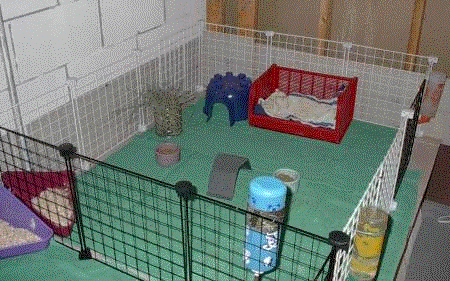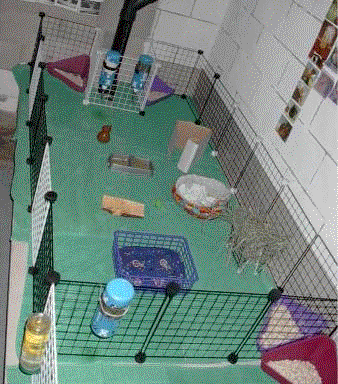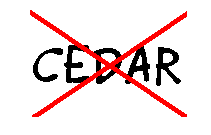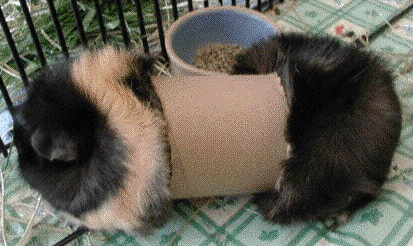
Space, cleanliness and light are probably
the 3 most important considerations for cavy (AKA guinea pig)
housing. If you fall short in these areas your pet may suffer
from stress, disease and depression.
Bigger is better! The bigger the cage
is the more ventilation and exercise your cavy will get, and
the healthier he will be. You will have the added advantage of
having to clean the cage less often. A single cavy's cage should
be at least 24" x 24" (or similar 576 square inches
of floor space). Cavy pairs need at least 30" x 24"
(720 square inches of floor space) and trios at least 36"
x 24" (864 square inches of floor space).

Cage height of approximately 12"
is good. To figure how many square inches of floor space a cage
offers you need to measure the floor of the cage on the inside
bottom. Measure length and width, multiply these 2 figures to
get total square inches of floor space.
I prefer wire body cages with 3"-4"
or so metal or plastic cage pans. Metal cages are better suited
to routinely clean and disinfect than wooden cages. They are
lighter weight than wooden cages or aquariums of the same size.
Aquariums and most plastic tubs do NOT make good guinea pig cages!
An average adult cavy weighs 2 ¼ - 2 ½ pounds,
and many reach 3 pounds and more. A 10 or 20 gallon aquarium
is definitely not roomy enough. High solid walls tend to isolate
a cavy. He is not as well exposed to the surrounding sights,
sounds and smells of his environment. This can be boring and
lonely for such a social animal, and may make a cavy more "wild"
and easily stressed. There is generally less ventilation in aquariums
and tubs than in wire cages. This and the cavy's tendency to
drink and urinate quite a bit results in increased humidity,
bacterial growth and odor. A fairly shallow clear tub with the
necessary square inches of floor space may be acceptable if the
cavy cannot get out and predators cannot get at him.
Wire floors should never be used in a
cavy cage. Their feet are not big enough or padded enough to
withstand wire floors. I have seen cavies with ulcerated feet,
deformed toes, and broken or missing limbs due to being housed
on wire floors.
The cage must be easily cleaned. It's
best if all surfaces can be disinfected and even de-bugged if
necessary. The cage door should be large and practical, and the
cage not much deeper than 2 feet, to make it easier to reach
and pick up the cavy.

Pens made out of coroplast board and wire
grid cube panels have become quite popular for cavies the last
few years. With a little work and creativity you can make a large
pen relatively inexpensively. Pens can be as simple or as spiffy
as you care to bother with.
 |
I do not recommend this type of housing
for homes with toddlers or predatory type pets that pose a danger
to the guinea pigs. While you can probably keep out the merely
curious by putting a top on the pen, I don't know that it's sturdy
enough to protect the cavies from a determined predator. For
details on purchasing supplies and instructions for assembling
the pen, check out CavyCages.com.

|
There are a lot of beddings available.
Probably the most affordable and very effective is aspen or pine
shavings. When purchasing pine bedding look for something that
is kiln dried and dust screened, this will eliminate much of
the irritating and unhealthy dust and oils. I believe most wood
bedding is kiln dried to some extent. Pine should be very dry
and soft, fluffy when uncompressed, and it should not have a
strong pine scent. Large "bales" of aspen or pine are
fairly cheap and can be purchased from most feed mill/farm supply
stores and some pet stores.
 |
Cedar should never be
used as chemicals in the wood are dangerous to skin, respiratory
system - and possibly even liver and kidneys.
|
Some of the recycled grain, wood or paper
products are also good, though usually much more expensive. These
are a good alternative if somebody in the house, human or cavy,
is allergic to wood bedding. I do not like ground corncob bedding
for cavies. It is hard and uncomfortable, and does not absorb
well.
Bedding should be changed as often as
necessary to keep the cage relatively dry and fresh. Once a week
usually isn't enough with cavies. Cage sizes I've recommended
should be cleaned every 4 days or so. Smaller cages than I've
recommended will need cleaning more frequently. Pans should be
washed and dried at least every other cleaning, the cage body
should be washed at least once a month. Cavies love a newly cleaned
cage.
Be very careful with cleaners and insecticides
you use around your pet. I have heard Lestoil and Lysol are toxic
to cavies. Dishwashing soap or a mild solution of bleach and
water is a good cage cleaner. Whatever you use must be thoroughly
rinsed off.
Adequate light is important to a cavy's
emotional as well as physical health. Natural sunlight is best,
but if your cavy is in a windowless room be sure to leave the
light on to simulate daylight hours. Good lighting will help
to increase your cavy's appetite, ability to handle stress and
overall good condition.
Room temperatures between 65° and
79°F are most comfortable for your cavy. Good ventilation
is required. Cavies must be kept out of direct sunlight and drafts.
They must also be protected from any possible predators (dogs,
cats, ferrets, etc.) and disease carrying pests (flies and mice).
Your cavy will appreciate some simple
toys or treats to keep busy with, such as destructible cardboard
tubes and boxes.
If there is a chance that your cavy could
get stuck in a tube be sure to cut it lengthwise before putting
it in the cage.
|
|
Add interest to a toilet paper tube by
stuffing it with hay. Wadded up balls of paper can be chewed
and thrown around. Cavies also love to play with paper lunch
bags - roll the open end a couple times so the bag stays open
better.
Hay is important to cavy nutrition, digestion
and well being. It should form a large part of the cavy's diet
and should always be available. Good quality grass hay (such
as timothy, bluegrass, canary, orchard, brome, etc.) is best
for adult cavies. Young growing cavies and pregnant or nursing
sows can also have the richer alfalfa hay. Cavies will happily
push around, tunnel through and lay on top of a nice mound of
hay. Hay racks can be added to make the cavy work for his hay.
Quality hay can be ordered from Oxbow
Hay Company in Nebraska 800-249-0366 (www.oxbowhay.com), American Pet Diner in
Nevada 800-656-2691 (www.americanpetdiner.com), or Kleenmama's
Hayloft near Seattle, WA 253-847-3896 (www.kmshayloft.com). See the following list
for suppliers of reasonably priced cages.
Follow these recommendations, add a huge
amount of love and attention, and your cavy will truly have his
Home Sweet Home.

Reasonably Priced
Small Animal Cages
Even with shipping costs I think you'll
get a much better cage for your money than those small high-priced
crappy cages most pet stores offer. If you don't see exactly
the size or style of cage in their catalog or web site - ask
if they have other cages available or if they can custom make
you a cage. Sometimes the bigger cages aren't listed if they
are not sold as often. Be sure to ask how the cage is set up
for cleaning and access to the cavy. MOST OF THE FOLLOWING PRICES
ARE FROM MARCH 2001.
Bridgeport Pets Bremerton, WA
Phone: 360-373-0455 FAX: 360-373-0458
Web: www.bridgeportpets.com
email: info@bridgeportpets.com
or sales@bridgeportpets.com
#CCE-2424 24" x 24" x 18" cage (good for single)
$34.95
#CCE-3024 30" x 24" x 18" cage (good for pair)
$45.95
Cages are collapsible and are shipped folded flat. Pans are thick
heavy duty plastic.
DA-MAR's Equipment So. Beloit, Illinois
Phone: 800-952-8669 FAX: 815-624-2883
Web: www.DAMARS.8M.com
email: DaMarsEqip@aol.com
24" x 24" x 14" cage - assembled (good for single)
$30.00
30" x 24" x 18" kit cage with top opening lid
(good for pair) $32.95
30" x 24" x 18" kit cage with slide out pan (good
for pair) $41.95
36" x 24" x 18" kit cage with top opening lid
(good for trio) $42.95
36" x 24" x 18" kit cage with slide out pan (good
for trio) $51.95
Economy J-Clip Pliers - $6.95 Deluxe J-Clip Pliers - $12.00
Kit cages need to be assembled. Clips and instructions are included,
a J-Clip Pliers must be purchased. Assembly is easy.
Woody's Wabbits Knappa, Oregon
Phone: 503-458-6003
Web: www.woodyswabbits.com
Email: woody@woodyswabbits.com
24" x 24" x 12" (good for single) $29.00-$35.00
30" x 24" x 12" (good for pair) $36.00-$43.00
Woody told me both these sizes can be shipped out assembled.
He does not have a 36" x 24" size available.
Nutritional Research Associates So. Whitley, Indiana
Phone: 800-456-4931
26" x 22" x 14" cage (good for single) $26.95
24" x 24" x 18" cage (good for single) approx.
$28.95
30" x 24" x 18" cage (good for pair) approx. $29.95
36" x 24" x 18" cage (good for trio) approx. $35.95
Shipping is extra for all 4 companies.
Sometimes shipping on 2 cages isn't much more than shipping on
one - so you might want to go in on an order together with somebody.
DA-MAR's and Nutritional Research Associates can custom build
cages to your own specifications if you need a certain size,
height or style.
Hope this helps you find your cavies the perfect home!
The piggies included
in the cage size chart were adopted from The Piggie Hutch.
This article and the JPGPR.com
logo are © 1993-2003 Vicki Palmer Nielsen - Jack Pine Guinea
Pig Rescue. No copyright is asserted herein regarding the illustrations
accompanying the article; copyrights, if any, of the illustrations
are retained by the original holders. If you would like to reproduce
anything from the website,
please first e-mail Vicki for permission at
:

|








